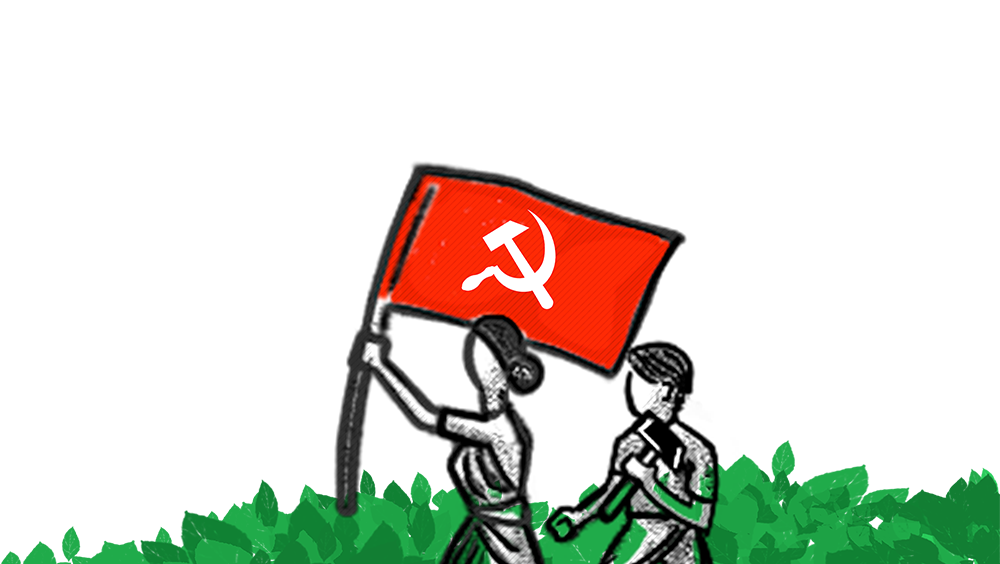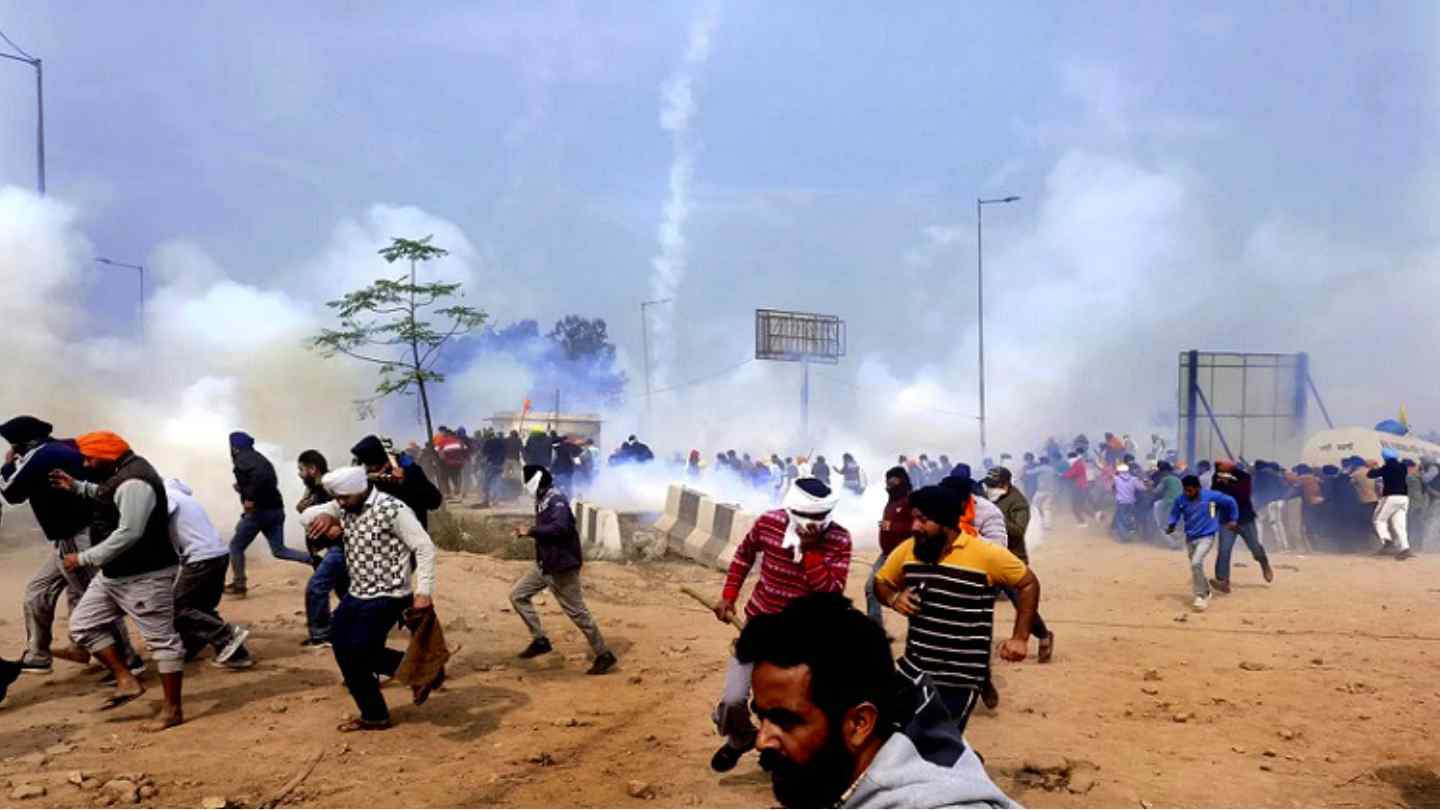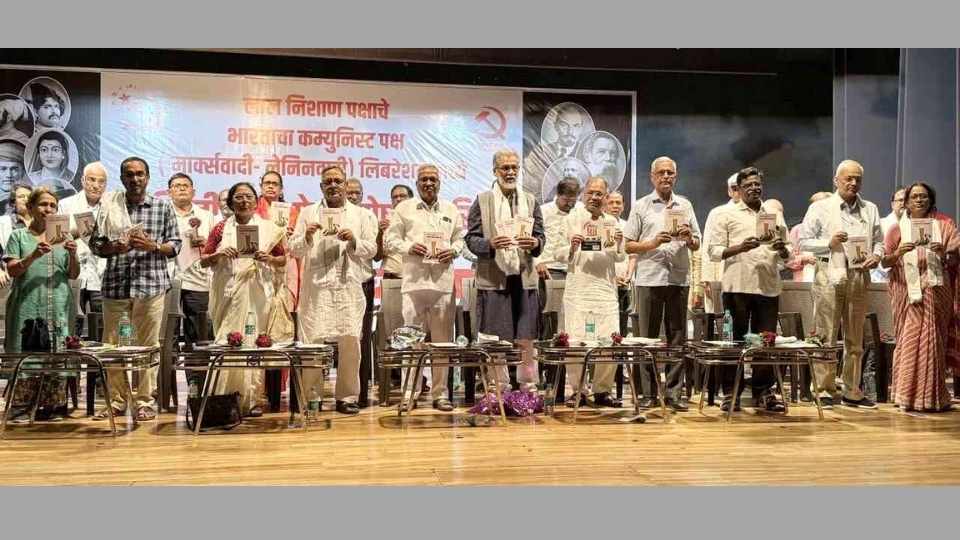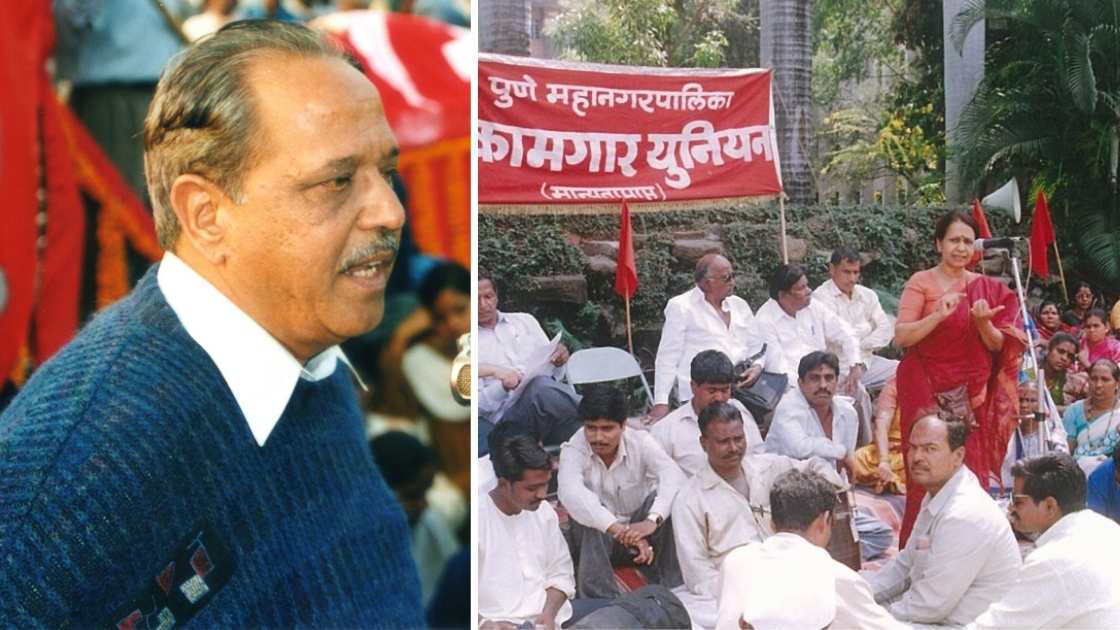And if you wish to tweet or post these structures of arrogance and repression on social media, you can't! The internet has been suspended in several districts of Haryana and Punjab which, since February 12. Even if you are able to post, it is likely that you will join the group of 177 (and increasing) social media accounts that have been blocked by the Indian government.
In fact, these farmers are asking the Union government to fulfil its own promise made in 2021. During the historic farmers' movement in 2020-21 led by the Samyukt Kisan Morcha (SKM) and other farmers organizations, the Modi government had promised to meet their four key demands. The government, in an agreement with the farmers, had promised to address the demands of legal guarantee for MSP; withdrawal of the draft Electricity Amendments Bill, withdrawal of criminal cases against farmers and compensation for the families of farmers who died during the year-long protest.
However, since then, the farmers have only experienced betrayal. Against this, in tandem with the working class have decided to embark on countrywide resistance actions.
February 16 Strike
Against the Modi regime's lies, the Samyukt Kisan Morcha along with the Central trade unions called for a countrywide rural and sectoral strike on 16 February. The Bandh was enforced in all states, including in urban and rural areas. In Delhi, the strikes were observed in all industrial clusters and a central protest program was organised at Jantar Mantar, near the Parliament Street.
In Punjab and Haryana, the strike action received widespread public support, with large parts of the states witnessing complete shutdown.
In Bihar AIKM, AIARLA and AICCTU along with other organisations organised protest marches and sit-ins in several district and block headquarters.
In Odisha, the rural bandh observed across the state. All India Kisan Mahasabha, AICCTU, and AIARLA participated in Puri, Rayagada, Kendrapara, Bhadark, Koraput, Khurdha, Nygarh, Balangir, Sonepur and Sundargarh. In Andhra Pradesh, hundreds of workers from various unions and sectors participated in the massive rally in Vijayawada. Workers in Tenkasi in Tamil Nadu organised a Rasta Roko with AICCTU banner.
The scheme workers, government employees and railway workers across the country joined the strike and expressed their unwavering solidarity with the farmers’ movements.
Delhi Chalo Call
Another group of farmers and farm labourers, under the banner of SKM (non-political), gave a separate call of Delhi Chalo (March to Delhi) on 13 February. This was stopped at the Punjab-Haryana border and met with severe repression by Haryana police and paramilitary forces deployed by the centre. These farmers are camping at Shambhu and Khanauli borders just outside Haryana, braving a continuous barrage of tear gas shells, rubber bullets, water cannons and even pellet guns.
On February 21, a 24-year-old youth, Shubharan Singh, was killed in the police action at Khanauli border. Three farmers have lost their vision in due to pellet firing by the forces, and two elderly farmers died during the protest.
The Haryana police and paramilitary have even attacked and damaged vehicles of those farmers and leaders who visited the protest site to express solidarity. Hundreds of farmers and youth have been injured until now, but farmers are determined to march to Delhi in the struggle for their demands.
On February 23, CPIML and AIKM organised meeting to pay tributes to Shubharan Singh and other martyred farmers at Bihar’s Daudnagar. Condemning the Modi regime’s repression on farmers, the people who joined the condolence meeting resolved to oust the anti-people regime in the up-coming Lok Sabha elections.
Modi Regime's Dillydallying
Amid the renewed push by farmers demanding the fulfilment of the promises, the Union Government proposed a five-year guarantee of purchase of farm produce for selected five crops, besides wheat and paddy. The farmers have unanimously rejected this proposal as a ploy for pushing ‘contract farming’ under the disguise of facilitating crop diversification. This offer to the farmers demanding minimum support price (MSP) for all crops and to all farmers, exposes BJP government's dishonesty as well as insensitivity towards the plight of the country's farming and rural people. Farmers’ morale remains in high spirit despite brutal tactics used against them and are enthusiastically coming forward to join the protest to teach Modi a lesson and to force the government to implement a legal guarantee on MSP on agricultural produce, loan waiver and other demands.
The SKM condemned the brutal repression on farmers and ‘dictatorial mindset of the Prime Minister Narendra Modi’ and gave the call to organise peaceful demonstrations, public meetings, torchlight processions in the Constituencies of MP’s of BJP and other ruling NDA parties. The SKM firmly rejected the proposal of a five-year contract with farmers to procure 5 crops, namely Maize, Cotton, Arhar/Tur, Masoor and Urad and reiterated the demand of MSP with C2+50% formula as recommended by the National Farmers Commission in 2006. SKM’s other major demands are loan waiver, no privatisation of electricity, a comprehensive crop insurance scheme under the public sector, Rs.10000 monthly pension to farmers above 60 years of age, dismissal from ministership and prosecution of Union Minister of State for Home Affairs Ajay Mishra Teni, the main conspirator of Lakhimpur Kheri massacre of farmers. The 13-month-long farmers’ movement of in 2020-21 had forced the Narendra Modi government to withdraw anti-farmer farm laws and the Electricity Amendment Act that was introduced by the regime to pave way for complete corporatisation of Indian agriculture. While withdrawing these Acts, the government had also agreed to address the other demands of the movement and constituted a committee for the implementation of the legal guarantee for procurement of 23 crops at MSP rates. Instead of addressing the matter with seriousness, the committee established by the government remained merely an eyewash, with no tangible progress or discussion regarding the demand for legal guarantees for MSP. Other agreed upon demands have had the same fate. With the current phase of farmers’ struggle the government has, besides unprecedented state violence, once again unleashed an intense vile propaganda with BJP troll machinery spreading lies and many ruling party leaders and self-styled experts trying to build a false narrative through godi media about MSP being impractical and even harmful for farmers’ welfare. On the contrary, a guaranteed legal MSP policy regime is very much possible, which in turn helps strengthen the rural economy and country’s food security [as explained in the box].
There is no doubt that the BJP government intends to protect cronyism and corporate control over the agriculture sector. Despite, the withdrawal of three farm laws under the pressure from the farmers' movement of 2021, the BJP regime continues to employ backdoor tactics in favour of the entry of corporations in the agricultural sector. This is the reason behind the government lacking political will power for bargaining in WTO for MSP and other subsidies. Farmers are fighting for inclusion of 94 percent of farmers who are out of the MSP regime.
The Central trade unions and farmers organisations have resolved to continue and intensify the agitations in the coming days. . The unions noted that the repression and violence have become defining characteristics of the ruling party having lost the confidence of people as well as realizing that they have lost the ground as because they know that they failed to deliver results in every promise they made to various sections of Indian masses. The toiling masses will thwart the diversionary and divisive designs of the BJP-RSS and guarantee the ouster of the disastrous Modi Gov in the coming Lok Sabha elections.
What is happening today with the farmers in India clearly reflects this intent of the government that is completely leaning in favour of the corporates.
The farmers are not begging, they're asking for their due.
Why Does the Modi Government Not Want a Legally Guaranteed MSP for Farmers?Will MSP be too burdensome for the state exchequer? The clear answer is No. It is being propagated that the government has to spend an extra sum of at least 10-16 lakh crores each year to procure MSP crops at declared prices. This is a misleading argument that hides the fact that food grains procured are to be sold in the market at a certain price; hence it is only the difference between the cost of procurement at MSP and the prevailing market prices of the particular farm produce in question. The market analysis wing of CRISIL has recently calculated this difference between MSP prices and current mandi [agriculture market] prices for 16 crops for the year 2023 to be around Rs. 21,000 crores only. In another estimate made in 2016 for 23 crops, this amount was around 47,000 crores. Now compare denial of minimum support price and enacting a law to guarantee the same with the government's gleeful submission to the National Company Law Tribunal's (NCLT) decision in December 2023 to waive off a whopping Rs. 46795.1 crores from Anil Ambani's long pending debt to various public sector banks and other financial institutions. This was only made possible because the Modi government had passed a law, 'Insolvency and Bankruptcy Code' in 2016. Ever since this law was brought in, several lakh crores of public sector banks' money, which mostly is common citizens' hard-earned earnings, has been wiped off by corporates through NCLT 'settlements,' which are now commonly known as haircuts. Until 2019, Rs. 2,40,932.58 crores were waived in settlements for nearly 250 companies that includes Patanjali owned Ruchi Soya and Jindal owned Bhushan Steel. So far NCLT has settled or given resolution plans in nearly 2500 cases where total haircuts amount to substantial money in lakhs of crores. The Modi government has actually given a legal guarantee to corporates of running away with public money, but does not want to give farmers a minimum price, even though MSP for all will require just a little fraction of the huge amount the government has waived for the corporates. Therefore, it is a blatant lie that providing legal guarantee for MSP will completely drain the government exchequer. Besides, banks have also written off lakhs of crores of rupees marked as NPAs during the past ten years, while farmers' indebtedness has increased in the same period. Today, every farmer is burdened with an average debt amount of Rs. 1 lakh over her/his head and is in dire need of minimum price support for her/his farm produce. The idea of MSP is as old as India’s quest for remunerative agriculture and food sovereignty. The LK Jha committee had recommended a policy of minimum support price for farmers in 1960 which was implemented first time in 1966 for the wheat crop. The Commission for Agricultural Costs and Prices (CACP) each year revises MSP for 23 crops, but there is no law to guarantee its implementation and more than 85% of the agricultural produce goes at rates much lower than MSP to private buyers and middlemen who have a monopoly over the market in mandis. The government procures 20-25% of food grains mainly wheat and paddy at MSP rates for public distribution system, NFSA and buffer stock to be sold in open market during lean season to balance the market prices. This procurement is primarily meant to provide subsidised food grains for the poor under the food security act, but it also controls prices in the open market to some extent. A legally MSP regime will not only make agriculture a remunerative profession where more than half of the country's population earns a livelihood, but also give the rural economy a boost. This can help ease grave unemployment in villages, and stop the forced migration in search for work and sustenance. Today, millions are forced to leave their villages and work under semi-slave conditions in other states and urban areas. The MSP regime will also enhance food sovereignty. Developed countries give their farmers huge subsidies, but they do not want agriculture subsidies in the developing world. A farmer in the US receives an average subsidy that approximately equals 40 lakh Indian rupees, and a farmer in India gets an average amount around Rs. 25000 as subsidy annually. In all developed countries, farming is highly subsidised, but they want the removal of subsidies in countries like India. The WTO provides a legal framework for this unequal treatment, which mandates for the maximum subsidy at 10 percent of the total value of production of that crop. And, the value of production is calculated at 1986 prices instead of current market prices, which is completely unjustified. MSP for all crops will also pave the way for much-needed crop diversification, as farmers won’t have to depend on wheat and paddy in hope of a government procurement. The current Prime Minister Modi in a statement in 2014, just before his party rose to power, had said “why should our farmers not get the right price? Farmers are not begging, they worked hard for it & should get good prices.” So, what changed now? Clearly, the Modi's government's dillydallying regarding MSP guarantee has nothing to do with the budgetary restrictions or fiscal concerns, it is about the intent.
|





